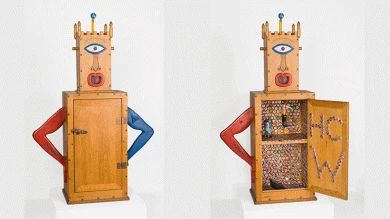-
Thursday, 7 March 2019 – from 10am to 1pm
Making a Home
Beatriz Velázquez
Admission: free, with prior registration by filling out this form
Capacity: 25 peopleExploring the work of an artist inevitably branches out into investigations which are broader in scope. Thus, studying the work of H. C. Westermann as a historian opens out into observing how his truly singular work was considered on a landscape crackling with change: Westermann, for instance, was seen as one of the imaginists of a new realism, and among those who left behind the specificity of formalism. If we look through another lens to analyse Westermann’s sculptural processes, we see how his pieces objectively endowed the unarticulated realm of experience. Finally, in examining the content of his works, the unfinished in all shelter can be heard in its persistence; that which, in a broader formulation, invites thinking about creation as making a home.
In a collaboration with Manuel Cámara, a specialist in Martin Heidegger’s work, this session will survey the construction of the retrospective, interlacing the different aspects of the study of H. C. Westermann with the final factor at play: its mise en scène in the rooms of the Museo Reina Sofía.
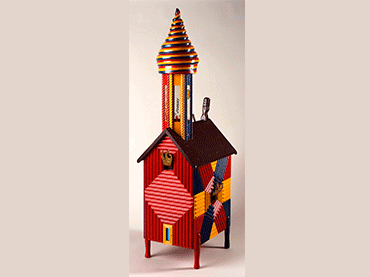
-
Thursday, 14 and Friday, 15 March 2019 – from 10am to 1pm
Apparently Irrelevant. Or When the Spectator Is Embodied Through A Piece of Furniture
Carlos Fernández-Pello
Admission: free, with prior registration by filling out this form
Capacity: 25 peopleSetting out from a challenge to the notion of object art in H. C. Westermann’s work, this two-day session explores the gallery bench as a seemingly irrelevant piece of furniture which, however, permits rest, interruption and discontinuation from the ergonomics of the art object. The bench first appeared as urban furniture in Paris halfway through the 19th century, in Barón Haussmann’s urban planning, forever linking the history of public seating to recreation management. Yet in a gallery context, the value of use of both furniture and artworks would be somewhat confused until the turn of the 20th century: spectators could move chairs and tables and paintings and sculptures, accommodating their physical and aesthetic needs. This logic was even upheld in the first museums, until the role of educating the general public called for a sequenced narrative and efficient and fluid itinerary, where the seat was an impediment or, rather, an official symbol of rest.
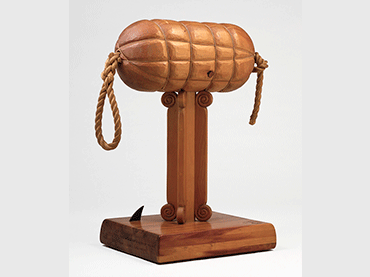
-
Friday, 22 March 2019 – from 10am to 1pm
H. C. Westermann and the Construction of Post-War Masculinity
Patricia Mayayo
Admission: free, with prior registration by filling out this form
Capacity: 25 peopleIn many of his pieces, H. C. Westermann, who served in the Second World War and the Korean War, cast an erroneous view of the masculinity that should be framed inside the changes experienced in post-war relationships and gender codes in the USA. Accustomed to a heroic narrative running through the art from that time, with its overt manifestations of implacable masculine genius in a sequence of major art movements, from Abstract Expressionism to Conceptual Art, Westermann’s work stood in a contrary position, in a space that questioned masculinity. This session is thus split into two parts: the first is a theoretical exposition, the second a practical workshop with a collective discussion and analysis of chapters 1, 2 and 6 from Beatriz Preciado’s book Pornotopía. Arquitectura y sexualidad en Playboy durante la guerra fría (Pornotopia. Playboy Architecture and Sexuality During the Cold War, Anagrama, 2010).
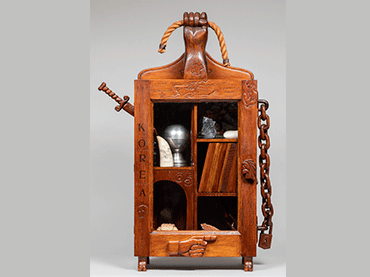
![H.C. Westermann. The Bronze Man [El hombre de bronce], 1977. Técnica mixta, 54 × 62 × 31 cm. The David and Alfred Smart Museum of Art, The University of Chicago; The H. C. Westermann Study Collection, donación de Dennis Adrian en memoria del artista](https://recursos.museoreinasofia.es/styles/large_landscape/public/Actividades/portada-g.gif.webp)
Held on 07, 14, 15, 22 Mar 2019
This research workshop is based on the exhibition H. C. Westermann. Goin’ Home, conceived as a kaleidoscope to shed light on a maverick account of post-war American art. Regarded as an artists’ artist, Westermann married the critical commitment of sculptors and painters schooled in Chicago — he studied at the Art Institute of Chicago himself on two occasions — with the iconoclastic visions of East Coast Funk Art sculptures. In Westermann there is the concurrence of physical object art, reminiscent of Pop’s most countercultural side, and the representation of an irrational America with a biting sense of humour; yet, despite his relationship with different movements, Westermann’s sculptures and drawings are fiercely unique and characterised by reflections on living, the construction of anti-monuments and a scrutiny of death.
The workshop comprises three sessions, the first conducted by the exhibition’s curator Beatriz Velázquez, the second by artist Carlos Fernández-Pello, and the third by art historian Patricia Mayayo, each of whom will pose questions that evoke the work of H. C. Westermann through the specific nature of their own disciplines.
These sessions are pitched at anyone interested in art as a process of knowledge from multiple perspectives: writing, artistic practice, curatorship, education and thought.
Organised by
Museo Reina Sofía
Educational program developed with the sponsorship of

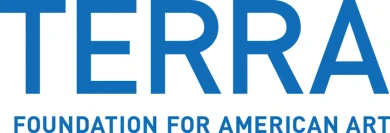
Participants
Manuel Cámara studied civil engineering, and is a specialist on Martin Heidegger’s work and H. C. Westermann’s oeuvre, examining the intersections between living and constructing in the artist’s work.
Carlos Fernández-Pello is an artist, designer and professor at IED Madrid. He combines his artistic practice with curating, audiovisual production, writing and DIY, and, through the object, his work focuses on a broad range of speculative and epistemological interests.
Patricia Mayayo is head professor of Art History at the Autonomous University of Madrid (UAM). Her research encompasses and crosses different fields of work: women’s history, feminist and queer historiography, and the study of contemporary artistic practices.
Beatriz Velázquez is the curator of the exhibition H. C. Westermann. Goin’ Home. After her initial studies in engineering, she studied the MA in Modern Art: Critical and Curatorial Studies at Columbia University (New York) and the MA in Contemporary Art History and Visual Culture run by the Museo Reina Sofía, where she currently forms part of the Exhibitions Department.
Más actividades

Institutional Decentralisation
Thursday, 21 May 2026 – 5:30pm
This series is organised by equipoMotor, a group of teenagers, young people and older people who have participated in the Museo Reina Sofía’s previous community education projects, and is structured around four themed blocks that pivot on the monstrous.
This fourth and final session centres on films that take the museum away from its axis and make it gaze from the edges. Pieces that work with that which is normally left out: peripheral territories, unpolished aesthetics, clumsy gestures full of intent. Instead of possessing an institutional lustre, here they are rough, precarious and strange in appearance, legitimate forms of making and showing culture. The idea is to think about what happens when central authority is displaced, when the ugly and the uncomfortable are not hidden, when they are recognised as part of the commons. Film that does not seek to be to one’s liking, but to open space and allow other ways of seeing and inhabiting the museum to enter stage.
![Tracey Rose, The Black Sun Black Star and Moon [La luna estrella negro y negro sol], 2014.](https://recursos.museoreinasofia.es/styles/small_landscape/public/Obra/AD07091_2.jpg.webp)
On Black Study: Towards a Black Poethics of Contamination
Monday 27, Tuesday 28 and Wednesday 29 of April, 2026 – 16:00 h
The seminar On Black Study: Towards a Black Poethics of Contamination proposes Black Study as a critical and methodological practice that has emerged in and against racial capitalism, colonial modernity and institutional capture. Framed through what the invited researcher and practitioner Ishy Pryce-Parchment terms a Black poethics of contamination, the seminar considers what it might mean to think Blackness (and therefore Black Study) as contagious, diffuse and spreadable matter. To do so, it enacts a constellation of diasporic methodologies and black aesthetic practices that harbor “contamination” -ideas that travel through texts, geographies, bodies and histories- as a method and as a condition.
If Blackness enters Western modernity from the position of the Middle Passage and its afterlives, it also names a condition from which alternative modes of being, knowing and relating are continually forged. From within this errant boundarylessness, Black creative-intellectual practice unfolds as what might be called a history of touches: transmissions, residues and socialities that unsettle the fantasy of pure or self-contained knowledge.
Situated within Black radical aesthetics, Black feminist theory and diasporic poetics, the seminar traces a genealogy of Black Study not as an object of analysis but as methodological propositions that continue to shape contemporary aesthetic and political life. Against mastery as the horizon of study, the group shifts attention from what we know to how we know. It foregrounds creative Black methodological practices—fahima ife’s anindex (via Fred Moten), Katherine McKittrick’s expansive use of the footnote, citation as relational and loving labour, the aesthetics of Black miscellanea, and Christina Sharpe’s practices of annotation—as procedures that disorganise dominant regimes of knowledge. In this sense, Black Study is approached not as a discrete academic field but as a feel for knowing and knowledge: a constellation of insurgent practices—reading, gathering, listening, annotating, refusing, world-making—that operate both within and beyond the university.
The study sessions propose to experiment with form in order to embrace how ‘black people have always used interdisciplinary methodologies to explain, explore, and story the world.’ Through engagements with thinkers and practitioners such as Katherine McKittrick, C.L.R. James, Sylvia Wynter, Christina Sharpe, Fred Moten, Tina Campt, Hilton Als, John Akomfrah, fahima ife and Dionne Brand, we ask: What might it mean to study together, incompletely and without recourse to individuation? How might aesthetic practice function as a poethical intervention in the ongoing work of what Sylvia Wynter calls the practice of doing humanness?

Intergenerationality
Thursday, 9 April 2026 – 5:30pm
This series is organised by equipoMotor, a group of teenagers, young people and older people who have participated in the Museo Reina Sofía’s previous community education projects, and is structured around four themed blocks that pivot on the monstrous.
The third session gazes at film as a place from which to dismantle the idea of one sole history and one sole time. From a decolonial and queer perspective, it explores films which break the straight line of past-present-future, which mix memories, slow progress and leave space for rhythms which customarily make no room for official accounts. Here the images open cracks through which bodies, voices and affects appear, disrupting archive and questioning who narrates, and from where and for whom. The proposal is at once simple and ambitious: use film to imagine other modes of remembering, belonging and projecting futures we have not yet been able to live.

Remedios Zafra
Thursday March 19, 2026 - 19:00 h
The José Luis Brea Chair, dedicated to reflecting on the image and the epistemology of visuality in contemporary culture, opens its program with an inaugural lecture by essayist and thinker Remedios Zafra.
“That the contemporary antifeminist upsurge is constructed as an anti-intellectual drive is no coincidence; the two feed into one another. To advance a reactionary discourse that defends inequality, it is necessary to challenge gender studies and gender-equality policies, but also to devalue the very foundations of knowledge in which these have been most intensely developed over recent decades—while also undermining their institutional support: universities, art and research centers, and academic culture.
Feminism has been deeply linked to the affirmation of the most committed humanist thought. Periods of enlightenment and moments of transition toward more just social forms—sustained by education—have been when feminist demands have emerged most strongly. Awareness and achievements in equality increase when education plays a leading social role; thus, devaluing intellectual work also contributes to harming feminism, and vice versa, insofar as the bond between knowledge and feminism is not only conceptual and historical, but also intimate and political.
Today, antifeminism is used globally as the symbolic adhesive of far-right movements, in parallel with the devaluation of forms of knowledge emerging from the university and from science—mistreated by hoaxes and disinformation on social networks and through the spectacularization of life mediated by screens. These are consequences bound up with the primacy of a scopic value that for some time has been denigrating thought and positioning what is most seen as what is most valuable within the normalized mediation of technology. This inertia coexists with techno-libertarian proclamations that reactivate a patriarchy that uses the resentment of many men as a seductive and cohesive force to preserve and inflame privileges in the new world as techno-scenario.
This lecture will address this epochal context, delving into the synchronicity of these upsurges through an additional parallel between forms of patriarchal domination and techno-labor domination. A parallel in which feminism and intellectual work are both being harmed, while also sending signals that in both lie emancipatory responses to today’s reactionary turns and the neutralization of critique. This consonance would also speak to how the perverse patriarchal basis that turns women into sustainers of their own subordination finds its equivalent in the encouraged self-exploitation of cultural workers; in the legitimation of affective capital and symbolic capital as sufficient forms of payment; in the blurring of boundaries between life and work and in domestic isolation; or in the pressure to please and comply as an extended patriarchal form—today linked to the feigned enthusiasm of precarious workers, but also to technological adulation. In response to possible resistance and intellectual action, patriarchy has associated feminists with a future foretold as unhappy for them, equating “thought and consciousness” with unhappiness—where these have in fact been (and continue to be) levers of autonomy and emancipation.”
— Remedios Zafra

ARCO2045. The Future, for Now
Saturday 7, March 2026 - 9:30pm
The future, its unstable and subjective nature, and its possible scenarios are the conceptual focus of ARCOmadrid 2026. A vision of the future linked to recent memory, a flash of insight into a double-edged sword. This year's edition, as in the previous two, will once again hold its closing party at the Reina Sofia Museum. This time, the star of the show is Carles Congost (Olot, Girona, 1970), one of the artists featured in the new presentation of the Collections recently inaugurated on the 4th floor of the Sabatini Building.
Carles Congost, with his ironic and timeless gaze, is responsible for setting the tone for this imperfect future, with a DJ session accompanied by some of his works in the Cloister on the first floor of the Sabatini Building of the Museo on the night of Saturday 7 March.
